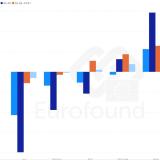In 2024, Eurofound continues to monitor and analyse how the EU’s labour market structure is changing, looking at patterns related to employment status, workers’ demographic characteristics, and net job creation and job loss by sector and occupation, particularly in light of the challenges triggered by COVID-19 and Russia's invasion of Ukraine. Analysis draws on data from the European Jobs Monitor (EJM), European Restructuring Monitor (ERM) and Eurostat and the work involves ongoing updates to the EJM and ERM databases.
In 2024, Eurofound publishes the findings of research investigating employment shifts across EU regions, from the pandemic to the recovery. In particular, the research focuses on the gap between urban/capital and rural areas and on patterns of sectoral specialisation which made some regions more exposed or resilient than others. The research investigates the evolution of telework across European regions, including the observed differences in the take up of regional telework. This work builds on the EJM regional analyses and the previous Eurofound/Joint Research Centre analysis on teleworkable jobs.
Eurofound finalises its analysis of the impact of short-time work schemes on retaining employment and securing incomes during the COVID-19 pandemic. One output from this project is a comparative database of the support measures used in the Member States. The research aims to derive policy lessons regarding effective instruments for future crises.
Complementing earlier research on mapping the incidence of labour shortages and assessing policies to address shortages, Eurofound concludes its analysis of company/organisational practices. Some case studies look specifically at how displaced people from Ukraine have been integrated into the labour market.
New research in 2024 investigates shifts in the employment structure in the first quarter of the 21st century, examining the pace of change (technological, globalisation/trade-related, demographic) and its impacts on labour markets.
Research begins on measuring job differences in task requirements and their implications for mobility and employment reallocation across the economy. It aims to determine the magnitude and the nature of changes in job tasks following a job move.
Work also commences on exploring wage determinants in the EU, with a specific focus on gender gaps. This research aims to identify correlations between trends in educational attainment and wages by gender, as well as the determinants of any mismatch between wages and education levels by gender.








































